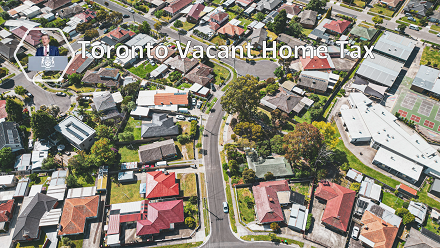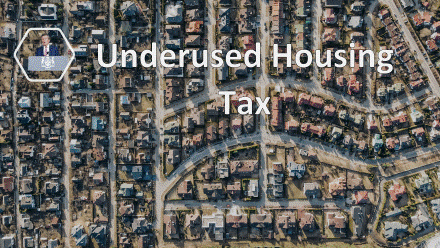MBB LAW INSIGHTS SERIES - REAL ESTATE

Toronto Vacant Home Tax
Background
As of January 1, 2022, City of Toronto’s By-law 97-2022 supporting the new Vacant Home Tax (VHT) came into effect. The goal of the VHT is to increase the supply of housing by discouraging owners from leaving their residential properties unoccupied.
Mandatory Declaration of Occupancy Status
All residential property owners in Toronto will be required to declare the status of their properties annually, even if they live there. The declaration will determine whether the VHT applies and is payable.
For residential properties that are occupied, but not by the owners, owners will be required to submit information about tenants and/or permitted occupants when making the declaration.
The deadline to declare a property’s 2022 occupancy status is February 2, 2023. Homeowners are required to make the declaration through the City’s secure online declaration portal:
VHT Calculation
A VHT of one percent of the Current Value Assessment (CVA) will be imposed on all Toronto residences that are declared, deemed or determined vacant in aggregate for more than six months during the previous year. For example, if the CVA of your property is $1,000,000, the tax amount billed would be $10,000 (1% x $1,000,000).
The tax is based on the property’s occupancy status for the previous year. For example, if the home is vacant in 2022 the tax will become payable in 2023.
Principal Residence Not Subject to VHT
“Principal Residence”
A “principal residence” is a residential unit occupied by an individual person, either alone or jointly with others, where the individual person is ordinarily a resident. A person may only have one principal residence, but a residential unit may be the principal residence of more than one person.
A principal residence is not subject to the VHT. For owners who own more than one home, only one of their homes will be considered their principal residence. All other homes owned by the owner are considered to be non-principal residences which shall be subject to the VHT unless it is either:
- designated as the principal residence of a family member or friend for at least six months of the prior calendar year; or
- rented out to a tenant, for a term of at least 30 days to occupy the home. The property must be occupied in aggregate for at least six months of the prior calendar year.
“Vacant” or “Deemed Vacant” Residential Units
A residential unit that is not a principal residence shall be:
- declared “vacant” if it has been unoccupied in aggregate for more than six months during the prior calendar year; or
- “deemed vacant” if the owner fails to make the declaration of occupancy status.
Vacant or deemed vacant residential units are subject to the VHT.
Exemptions from the VHT
The By-law has made a few exemptions from the VHT requirements, including situations where :
- the home is undergoing repairs or renovations;
- the principal resident is residing in a hospital;
- the legal ownership of the vacant unit has been transferred to an arm’s length transferee; or
- the homeowner has died.
No tax is payable by a homeowner in respect of a vacant residential unit if any of the above applies. However, if the residential unit is deemed vacant due to the owner’s failure to make the declaration of occupancy status, the above exemptions will not apply, and the homeowner will be subject to the VHT regardless of the above exemptions.
Late Declarations
If the property status declaration is not made by the declaration deadline of February 2, 2023, a fine of $250 will be issued.
Failure to make a declaration will result in the home being deemed vacant. Once deemed vacant, the home will be subject to the VHT.
The By-law also includes provisions for penalties for failure to pay and fines for various offences.
If you want to know more about the VHT, please contact us.

Underused Housing Tax
Background
The Underused Housing Tax Act imposes an annual 1% underused housing tax (UHT) on the value of vacant and underused residential properties owned directly or indirectly by those who are not Canadian citizen or a permanent resident of Canada. It became effective on January 1, 2022, and the first tax return for the year-end December 31, 2022 is due on April 30, 2023.
Mandatory Declaration by Non-Canadian Residential Property Owners
Every owner of a residential property, other than an “excluded owner”, must file an annual declaration with the Canada Revenue Agency (CRA) for each residential property owned.
“Excluded Owners”
An “excluded owner” is not subject to the UHT. Excluded owners include the following, as of December 31:
- Canadian citizens and permanent residents of Canada;
- Corporations listed on a Canadian stock exchange;
- Registered charities;
- Cooperative housing corporations;
- Indigenous governing bodies or corporations owned by Indigenous governing bodies;
- Municipalities or corporations owned by municipalities;
- Government of Canada or an agent of the Government of Canada; and
- Universities, public colleges, school authorities, hospital authorities.
Private corporations, partnerships, and trusts are not excluded owners and, therefore, are subject to filing an annual UHT declaration if they own a residential property, even if there is no UHT owing.
Residential Properties Located in Canada Subject to the UHT
The UHT applies to every legal owner of “residential properties” located in Canada unless the owners are excluded owners or if an exemption applies.
“Residential properties” include:
- Detached homes;
- Detached homes with up to three units (e.g., duplex, triplex);
- Semi-detached homes;
- Row houses; and
- Condominiums.
Exemptions
If an owner is not an excluded owner, the residential property owned may be exempt from the UHT. These exemptions include:
| Primary Place of Residence |
|
| Qualifying Occupancy |
|
| Specified Canadian corporation |
|
| Partner of specified Canadian partnership |
|
Trustee of specified Canadian trust
|
|
| Uninhabitable property |
|
| Ongoing renovations |
|
| Acquisition of interest |
|
| Deceased owner and other owner |
|
| Newly constructed property |
|
Owners who do not qualify as excluded owners must file a UHT declaration if they own a residential property and claim the exemption, even if no UHT is payable.
How Much Is the UHT?
The UHT is 1% of the home’s taxable value or 1% of its most recent sale price, whichever is greater. Owners can also file an election between January 1 and April 30 of the following calendar year to use the property’s fair market value to determine the owing UHT and if they can obtain an appraisal.
If two or more individuals hold title to a property, each owner will be responsible for the UHT based on their ownership interest.
Failure to File Declarations
If an owner fails to file a declaration in respect of a residential property for a calendar year, the owner would not be entitled to the exemptions.
When assessing the owner for UHT and penalties, the CRA would have the discretion to use the fair market value of the property at the time an assessment is issued in calculating the amounts owing.
Failure by an owner to file a declaration in respect of a property for a calendar year could also result in significant consequences for the owner, as well as penalties and interest.
For further details, please contact us.
